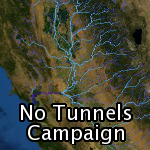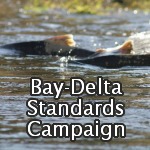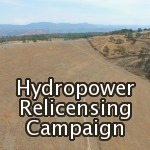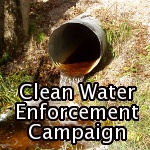On Sunday April, 7, 2024, friends of Bill Jennings gathered by the Mokelumne River to remember and celebrate his life and achievements. The following eulogy was delivered by Chris Shutes, Executive Director of California Sportfishing Protection Alliance.
Eulogy for Bill Jennings, by Chris Shutes
Good morning, everyone. Thank you very much for coming.
We’re gathered here on this cold but sunny Delta morning to remember our friend and colleague Bill Jennings.
We remember Bill here on the banks of the lower Mokelumne River, a river that Bill and his friends brought from the brink of ruin to become the home of one of the most abundant salmon runs in California.
Bill did not have family, at least that he talked about or kept up with. He was an only child. For the last years of her life, Bill’s mother lived close to Bill in Stockton until her death in 2000.
So in many regards, Bill’s family, such as it was, was drawn from the ranks of players and actors in the world of California fisheries, water policy, and pollution enforcement. Most all of us here today are part of that world. Many others who are part of that world sent regrets, remembrances, and best wishes.
Bill was a profoundly moral man, motivated by an overriding sense of justice and acting for the common good. It is fair to say he was a moral inspiration to many. He recognized the power of putting people face to face with their own moral poverty. His experience as a young man in the civil rights movement and draft resistance in Tennessee surely shaped that recognition.
But for all his time and leadership in the realm of moral persuasion, Bill didn’t have much truck with organized religion. So it’s left to some of his friends and colleagues to remember him today.
For the few of you who don’t know me, I’m Chris Shutes. For seventeen years, I worked for Bill and Bill’s organization, the California Sportfishing Protection Alliance, otherwise known as C-S-P-A, C-Spa, CalSpa, Sispa, or other, depending on the venue and the epoch of initial acquaintance. At Bill’s direction, I’ve taken over the leadership of CSPA and a majority of its program work. And thus it’s also fallen to me to preside today, because it is unimaginable that an event to remember Bill would be organized by any entity other than CSPA.
After he became Executive Director of CSPA in 2005, Bill built CSPA into a powerful statewide advocate for fisheries, abundant water in rivers and estuaries, and clean water. He was tireless. I think he had a degree from the University of Tennessee in something, but I have no idea what. It didn’t matter. Bill was widely read and, for what he spent the last half of his life doing, almost completely self-taught. Learning by doing, he figured out how different parts of the regulatory world of water work. He saw how to adapt lessons on one issue and deploy them on another issue. And another. And another. He was relentless.
Bill’s career as a water advocate really started with the Committee to Save the Mokelumne in the mid-eighties. Bill and friends formed the Committee in 1987 following the death of almost all the salmon in the Mokelumne River Fish Hatchery, located right downstream of Camanche Dam about thirty miles east of where we are today.
There were so many problems. Mine runoff from the old Penn copper mine was leaching into Camanche Reservoir, killing life in the reservoir and downstream. The hatchery was also seeing die-offs from high water temperatures, lack of oxygen, and simply lack of flow.
So Bill put his own stamp on the term “all-of-the-above” strategy. He went after East Bay MUD, the owners of Camanche and the land around it, including Penn Mine, at every regulator he could think of. He brought in a new organization called CSPA to help.
Among his papers, I found a poster that’s 3 by 3½ feet in size. It’s got about two hundred boxes on it, each of which shows a step in the regulatory pathway Bill blazed and followed to save the Mokelumne.
So here’s a few of the major trailheads:
- Bill filed a complaint against EBMUD at the State Water Board.
- He filed a public trust lawsuit against EBMUD.
- He filed a complaint at the regional water quality control board over pollution from Penn Mine.
- He filed a complaint with, and thus solicited the support of, the San Joaquin County District Attorney, who went after EBMUD in court.
- He filed a complaint with the US Environmental Protection Agency seeking declaration of Penn Mine as a “point source” of pollution
- He filed a complaint with the Federal Energy Regulatory Commission and actually got FERC to re-open EBMUD’s hydropower license.
All of these actions led to further regulatory process, and many ended up in court. A few of you who are here today were there with Bill on one or more of these pathways.
And there was another series of what one might call softer-path actions, building support, getting the word out, and addressing a bunch of other problems on the Mokelumne River. It was a full-out campaign.
In the end, Penn Mine was cleaned up. That really worked. There was a settlement agreement among EBMUD and two fish agencies that resolved the FERC and water rights processes. Bill of course didn’t sign that settlement; he wanted more water.
As I have come to learn, 10-13 years start to finish is about the time horizon for an awful lot of regulatory processes relating to fish and water. Sometimes, it’s a lot longer.
The outcomes on Mokelumne, I think, shaped much of what became Bill’s preferences in his advocacy. He liked water quality enforcement because it has clear standards. Compliance is not ambiguous. A judge generally decides if a regulator is unwilling.
From the Mokelumne experience, Bill learned the power of the Clean Water Act. And he leveraged it to new levels. At one point he told me that CSPA had prosecuted more citizen enforcement actions under the Clean Water Act than any other non-profit in the country. Bill initiated that whole line of advocacy at CSPA.
Bill thought less of stakeholder processes, like hydropower relicensings. He sat through a lot them in the nineties. He lost patience and for the most part eventually lost interest. He happily left those to Chris.
When Bill died, he left a room full of binders and an attic full of boxes with the paper records of his work, mostly before about 2007 when he started keeping most of his work and records on a computer. Dave Fries and I spent about eight sessions going through Bill’s paper documents, deciding what was appropriate to send to a new Bill Jennings archive at the University of the Pacific. There were just under 30 boxes of documents from the Mokelumne campaign of the 80’s and 90’s. There were another 40 boxes of other materials.
It was quite an experience going through those papers, most of which had not been reviewed for a long, long time. There were records of proceedings relating to the permits for wastewater treatment plants of most of the bigger cities that ring the Delta: Sacramento Regional, Stockton, Manteca, Lodi, Modesto, Lathrop, Davis. For Sac Regional, there were binders for four separate rounds of permitting.
There were also many files from the days before 2005 when Bill was the Deltakeeper, part of San Francisco Baykeeper. In those files were folders on a series of local industrial facilities, where someone working for Bill had gone to sites, mostly around Stockton, checking stormwater runoffs. Included there were photos of the facilities and observations about them. From that era were a lot of write-ups of water quality samples that people working for Bill had collected in the Delta.
Dave and I heard the story from Ernie Mitchell, who lives on the property Bill rented in Stockton, about how Bill had taken the stove out of the kitchen because he wanted the space for water quality testing equipment.
In various parts of Bill’s files, I found copies of reports by Felix Smith, the US Fish and Wildlife Biologist who blew the whistle on deformed waterfowl at the Kesterson Wildlife Refuge. Felix did some of the reports for Bill; others, Felix just sent to Bill so Bill would have them. I pulled all of those reports; eventually, they’ll end up electronically on CSPA’s website.
The sheer amount of work those binders and files represent is staggering. Bill was tireless as well as relentless.
I first met Bill in 2006. John Beuttler, CSPA’s Conservation Director, had recruited me to represent CSPA in a hydropower licensing proceeding on Butte Creek. Going to meet Bill at a Denny’s in Sacramento, John told me to not say very much, which of course is a hard thing for me to do. So I talked a bit about my years of volunteer experience with hydropower. Bill asked me only one question, which I’ll have to paraphrase at bit. He asked, “Can you kick an adversary where it hurts and still maintain decorum?” In this case, I complied with Beuttler’s recommendation and answered with one word: “Absolutely.” Jennings said “Okay” and got up and left. The whole interview took less than half an hour.
As well as being colorful, this story illustrates something about Bill’s approach to advocacy. You fight to win, but you don’t get to be a jerk. A key point for CSPA came about 6 months later, when CSPA faced a crisis about how to work with whitewater boaters on the Feather River. Bill listened to the various opinions and then wrote a memo to the CSPA Board and staff, framing the issue as: “I guess the question before us is whether CSPA can play well with others.” Some folks saw it differently, and left the Board. One staff member resigned. All of a sudden, I became a very busy guy. I guess that’s part of what happens when you do play well with others.
As I later learned, Bill had another key principle: you do your homework, and you back up what you say. It’s all right to have a general way of looking at things. But being more or less right in general does not mean you can skate on particular issues because you’re a good guy. Bill’s general view was that the answer to any issue should come down to the evidence.
I never met anyone who believed more in the law than Bill. It is no surprise that many of you here today are attorneys, and Bill was profoundly grateful for the work each of you did on his behalf. One of the things that particularly scared Bill was the Trump administration’s concerted effort to change bedrock environmental laws. Sometimes bedrock isn’t as solid as you thought it was.
For the first eight years or so that I worked for Bill, I didn’t really talk with him very much. He made me show up at the Delta flow criteria workshops in 2010, after I had convinced him they were worth the effort despite the fact that they weren’t going to lead to a final decision. But mostly, I went my way and he went his.
Bill and I started talking a lot more in 2014 when the big drought hit. We had to show up at the Water Board four or five times in a few months to defend weak Delta water quality standards from being made weaker still. Bill recruited me to draft comments and pull multiple materials and documents together, and he decided I was good enough to do that. Bill was a very good writer, but he was happy to have someone else do the editorial and administrative grunt work. One of Bill’s first pieces of advice to me about writing was the phrase “simple declarative sentences.” In the last few years of Bill’s advocacy, it was I who was shortening his sentences and paragraphs. He, and others, taught me well.
By the end of 2015, Bill was having problems getting around such that he really didn’t want to come to Sacramento. So he’d write a speech the night before a Board meeting, send it to me late at night, and ask me to go before the Board and read it. Now Bill was a wonderful speaker, but a lot of that had to do with his delivery and his persona, and asking me to read his speeches just wasn’t me or him. So I’d sometimes change things around a little. And sure enough, as soon as I’d get done, my cell phone would ring and he’d tell me what I didn’t say. One day I finally told him that if he had to have it as written, he was going to have to come to Sacramento and say it himself. After that, we reached détente.
This of course was all before the days of Zoom and Covid. Bill was glued to the live video of many Water Board meetings, and I showed up to speak at quite a few. I learned that about the highest praise I could get from Bill was that I did okay. Then Bill would spend ten minutes talking about the wonderful speeches of Gary Bobker or Doug Obegi.
After about 2014, Bill and I also started chatting more on the phone. In part, it was during weekly calls with Bill, our treasurer Cindy, and our webmaster Denise about the CSPA website and such. Those calls often digressed. But I also had more calls about current events or basketball or jazz. After CSPA President Jim Crenshaw died very unexpectedly in late 2019, my calls with Bill became more frequent.
Bill was going strong on the work front right up to the day of his auto accident in late June, 2021. He was staying up till 1 or 2 in the morning writing and researching, and sending out emails, to be sure we got everything in our submittals just right.
With the accident, it all changed. Overnight, emails went to near zero. The fight had pretty well gone out of him. It was shocking. And it was immensely sad. Though the immediate injuries did not seem particularly bad, Bill just never got better. And after a while, he seemed to stop trying to get better. The isolation from the age of Covid made the situation way, way worse.
Kathy Keeling and Dave Fries stepped in so much and kept Bill going for so long. Eventually they just passed the limits of their ability to help. When Bill went to an assisted living facility in September 2022, he didn’t even take a computer. He was past the point of wanting to learn more about using his cell phone. Covid, on top of all his underlying health problems, caught up with Bill that December. He never made it home from his “temporary” stay in assisted living.
Bill was a real aficionado of jazz, and had an impressive collection of jazz CDs. Near the end of his life, he had several jazz stations dialed up on his computer, and he mostly relied on those. Austin and outlaw country music sometimes speaks to me in the way jazz spoke to Bill, and I have found myself remembering, before and after Bill’s death, the words of a tune from Willie Nelson and Merle Haggard that says, “we’d’ve taken better care of ourselves if we’d know we were going to live this long.” I wish Bill had taken better care of himself. I wish he hadn’t lived the last years of his life so often alone.
So remember Bill Jennings and the amazing work he did. Remember his kindness and the profoundness of his concern and his love for humanity, for this earth, for the natural world, and for this Delta. Remember his dedication and his dauntless work ethic. And take care of yourselves and each other.
The most important thing to Bill was that his life’s work in CSPA would continue. It will continue, and it will continue to cover the breadth of work Bill directed. It is also making sure there are people to follow who have the knowledge and skills to make it even more effective than it has been to date.
Thank you everyone. Please stay and talk. It’s a smallish but very interesting group of people gathered here today. Those include CSPA staff Sarah Vardaro and Angelina Cook. They also include CSPA Treasurer Cindy Charles and CSPA webmaster Denise Zitnik. And they include CSPA Board members Richard Izmirian, Dave Fries, Deirdre des Jardins, and Richard McHenry, as well as Mike Jackson. Please introduce yourselves to these people as you find them.
I hope today brings you strong and warm memories of Bill. Bill would probably say that it was okay, but that my description of some of Bill’s actions and adventures would have been better if Gary Bobker had done it.









